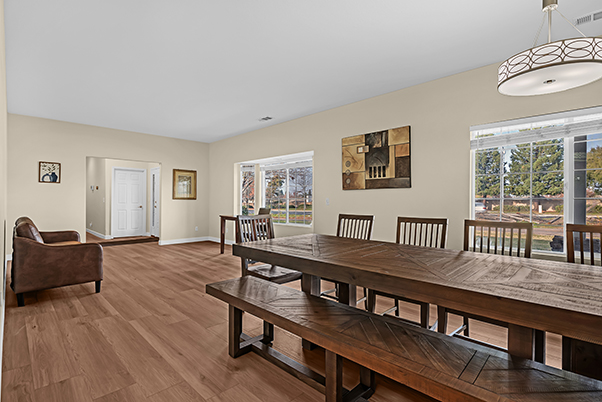Safe tapering. Evidence-based therapy. Long-term recovery.
Benzodiazepine Addiction Treatment
In Northern California, misuse often occurs alongside alcohol, opioids, or other prescription medications, increasing the risk of overdose and complicating recovery. Professional treatment is essential to safely taper off benzodiazepines and address underlying issues.

Understanding Benzodiazepine Addiction
Benzodiazepines, including Xanax, Valium, and Ativan, are prescribed for anxiety, panic, or sleep disorders. While effective short-term, long-term use can lead to physical dependence, tolerance, and withdrawal risks. Abrupt discontinuation may cause severe symptoms such as anxiety, insomnia, seizures, and mood disturbances.
Our Approach to Benzodiazepine Addiction
Comprehensive Assessment
Clients receive a detailed evaluation covering:
- Prescription history and dosage patterns
- Co-occurring mental health conditions (anxiety, depression, PTSD)
- Physical health status
- Personal and family support systems
This ensures a personalized treatment plan for a safe and effective recovery journey.
Medically Supervised Taper & Detox
Gradual tapering under clinical supervision is critical for safety. CRC’s medical team monitors withdrawal symptoms, manages side effects, and adjusts the taper schedule as needed.
Treatment Programs
- Residential / Inpatient Care – 24/7 support for clients with high-dose or long-term benzo dependence.
- Partial Hospitalization Programs (PHP) – Intensive day programs providing structured therapy while living at home.
- Intensive Outpatient Programs (IOP) – Evening or flexible programs to maintain work, school, or family responsibilities.
- Outpatient Programs – Individual and group therapy sessions with lower intensity for those in stable recovery.
- Telehealth Services – Secure online therapy for Northern California clients unable to attend in-person.
Evidence-Based Therapeutic Modalities
Our clinicians use research-backed therapies tailored for benzodiazepine recovery:
- Trauma-Informed Care – Addressing underlying trauma and emotional triggers.
- Cognitive Behavioral Therapy (CBT) – Changing thought patterns and behaviors that contribute to misuse.
- Dialectical Behavior Therapy (DBT) – Strengthening coping skills, emotional regulation, and stress management.
- Community Support Groups – Encouraging peer connection, accountability, and motivation for long-term recovery.
Holistic Supports for Long-Term Recovery
Recovery extends beyond stopping substance use. CRC provides:
- Mindfulness & Stress Management – Meditation, yoga, and breathing techniques
- Nutrition & Physical Wellness – Building healthy routines to restore energy and resilience
- Family Counseling & Education – Engaging loved ones in the recovery process
- Alumni Network – Lifelong peer support and relapse prevention resources
NORTHERN CALIFORNIA EXPERTISE
Why Choose California Recovery Center?
Benzodiazepines, such as Xanax, Valium, and Ativan, can lead to dependence and challenging withdrawal when used long-term. At California Recovery Center, we provide safe, evidence-based treatment tailored to each individual. Our programs in Sacramento, Roseville, and Northern California combine medically supervised tapering, therapy, and ongoing support to help clients overcome addiction and rebuild healthy, balanced lives.

Full Continuum of Care
From medically supervised tapering to inpatient, outpatient, and telehealth support.

Individualized, Evidence-Based Treatment
Tailored plans that address both addiction and co-occurring mental health issues.

Holistic Approach
Physical, emotional, social, and spiritual well-being integrated into care.
Frequently Asked Questions
If you or a loved one is struggling with benzodiazepine dependence, you likely have questions about withdrawal, treatment options, and recovery. Below are answers to some of the most common concerns we hear from clients at CRC.
Are benzodiazepines addictive?
Yes. Long-term or high-dose use can lead to physical dependence, tolerance, and withdrawal symptoms when stopping.
What are common withdrawal symptoms?
Symptoms may include anxiety, insomnia, irritability, tremors, nausea, and, in severe cases, seizures. Medical supervision is recommended.
Is detox necessary for benzodiazepine addiction?
Yes. Gradual, medically supervised tapering is the safest way to reduce dependence and minimize withdrawal risks.
How long does treatment take?
Duration varies based on dosage, length of use, co-occurring conditions, and the level of care required. CRC creates personalized plans for each client.
Can therapy be done remotely?
Yes. CRC offers secure telehealth sessions for clients throughout Northern California.
Will treatment address co-occurring mental health conditions?
Absolutely. Anxiety, depression, trauma, and other behavioral health challenges are treated alongside benzodiazepine dependence.
Can I continue work or school while in treatment?
Outpatient programs and telehealth options allow clients to receive structured therapy while maintaining daily responsibilities.
Is family involvement part of the recovery process?
Yes. Family counseling and education are encouraged to strengthen support and improve long-term outcomes.
Benzodiazepine Use in Northern California
Benzodiazepine dependence is a growing concern in Northern California communities such as Sacramento and Roseville. While these medications are often prescribed for anxiety, insomnia, or panic disorders, long-term or high-dose use can lead to physical dependence, cognitive challenges, and potentially dangerous withdrawal symptoms. According to data from the AAFP, individuals with a history of substance use disorders are at particularly high risk of benzo misuse.
Co-prescription of benzodiazepines with opioids is especially alarming: in some cases, over 17% of patients being treated for opioid use disorder also have overlapping benzodiazepine prescriptions. This combination increases the risk of overdose and complicates treatment.
Moreover, toxicology reports from California’s unintentional overdose surveillance system show that benzodiazepines are frequently detected in fatal overdose cases—even if they are not listed as the direct cause of death.
Because of these risks, safe, medically supervised tapering and integrated behavioral health care are essential. Evidence-based therapy, early intervention, and continuous monitoring improve recovery outcomes and help prevent serious complications associated with benzo use in Northern California.

